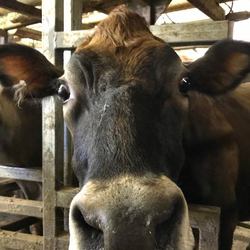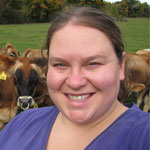
Identified: She calved in with a blind quarter. If I had to choose one, this is the best kind of three-quartered cow to have simply because it’s done. Boom. There’s nothing to milk, nothing to treat, and nothing to doctor. It will probably never milk again, but it will also most likely never bother her again.
Infected: She got mastitis that you couldn’t cure. You tried everything, like truly everything. In my experiences, this is the type of three-quartered cow most likely to become four-quartered again. Though, it’s still not all that likely.
Injured: These are the worst! She tramped her own teat, or a different cow did it for her, either way there’s been physical damage done. The problem is that these eventually swell to a point where the milker physically can’t milk them. Then, they get mastitis and kick you for a month before you inevitably come to the decision that you can’t win this battle. Then she becomes an infected, soon-to-be three-quartered cow.
No matter what kind of three-quartered cow you’re dealing with, the real problem is what comes next. What do you do with her? In two of these scenarios (infected and injured), she’s probably going to get sick. Knowing that there’s not much you can do about the real problem, you could spend lots of money and time providing supportive care. The alternative is selling her before it gets that bad. In an ideal world, every infected or injured three-quartered cow is close to going dry and you can just dry her off early giving her the chance to naturally fight the infection!
Here’s the thing . . . selling a three-quartered cow before I know what kind of three-quartered cow she’s going to be has never set well with me. She’ll probably never reach her full production, and there’s always the risk of someone milking the wrong quarter but selling her without giving her chance doesn’t seem fair. Given a chance, a three-quartered cow can still be a productive and profitable cow.

The author dairies in partnership with her parents and brother at Spruce Row Farm in Pennsylvania. Jessica is a graduate of Pennsylvania State University, and since 2015, she has been active in promoting dairy in her local community. You can find her and her 250 Jersey cows on Facebook at Spruce Row Dairy or on Instagram at @seejessfarm.








